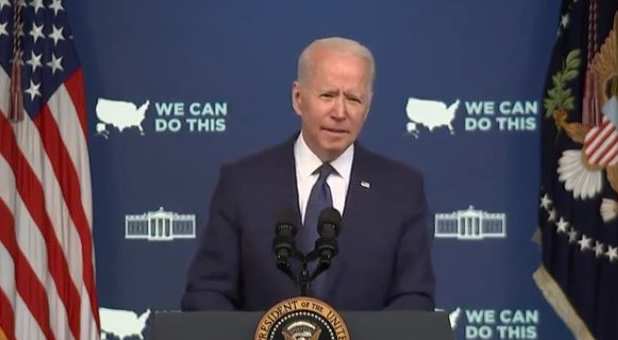Amid Concerns, Biden Administration Announces ‘Door-to-Door’ Plans for Vaccine Distribution
After falling short of its Fourth of July goal of having 70% of the adult population vaccinated against COVID-19, the Biden administration has announced plans to implement a door-to-door campaign, multiple outlets report. The effort, pitched during a Tuesday press conference, also comes amid concerns about such a mass effort and the effectiveness of the vaccine against COVID-19’s new Delta variant.
“Now we need to go community by community, neighborhood by neighborhood and often times door-to-door—literally knocking on doors, to get help to the remaining people protected from the virus,” Biden said.
How the administration intends to accomplish this remains unclear. “You don’t just give up just because you haven’t reached every single person,” White House press secretary Jen Psaki said. “We’re going to continue to apply what we’ve seen have been the best practices over the past several months.'”
Reactions to the proposed vaccination push were swift. Rep. Dan Crenshaw, R-Texas, expressed his opinion via Twitter, “How about don’t knock on my door”?
How about don’t knock on my door.
You’re not my parents. You’re the government. Make the vaccine available, and let people be free to choose.
Why is that concept so hard for the left? https://t.co/Fkv3kzNh6S
— Dan Crenshaw (@DanCrenshawTX) July 6, 2021
Congressional candidate Lauren Boebert, R-Colo., also tweeted out her dismay:
The government now wants to go door-to-door to convince you to get an “optional” vaccine.
— Lauren Boebert (@laurenboebert) July 6, 2021
Current medical research reveals concern about the effectiveness of the vaccine against the new variant. “After people recover from an infection with a virus, the immune system retains a memory of it. Immune cells and proteins that circulate in the body can recognize and kill the pathogen if it’s encountered again, protecting against disease and reducing illness severity,” per the National Institutes of Health. “This long-term immune protection involves several components [among these are antibodies, T cells and B cells]. All of these immune-systems components have been found in people who recover from SARS-CoV-2, the virus that causes COVID-19. But the details of this immune response and how long it lasts after infection have been unclear.”
“Researchers from the La Jolla Institute for Immunology analyzed immune cells and antibodies from almost 200 people who were exposed to [COVID-19] and recovered. … [R]esearchers found durable immune responses in the majority studied,” also per the NIH. “Antibodies against the spike protein of [COVID-19], which the virus uses to get inside cells, were found in 98% of participants one month after symptoms onset…[P]romisingly, their levels remained fairly stable over time, declining only modestly at 6 to 8 months after infection.”
“A new study conducted on more than 100 healthcare workers (HCWs) at three centres found the Delta variant [B.1.617.2] eight times less sensitive to antibodies generated by the COVID-19 vaccine when compared to the original strain that came from [Wuhan, China],” reports a New Delhi, India, source.
The source continued, “The collaborative study … found that the B.1.617.2 Delta variant not only dominates vaccine-breakthrough infections with higher respiratory viral loads compared to non-Delta infections but also generates great transmission among the fully vaccinated HCWs. [I]n vitro, the Delta variant is approximately eight-fold less sensitive to vaccine-elicited antibodies compared to Wuhan-1.” {eoa}
For more than a decade, Tiffany Benson‘s passion for writing has exceeded most of her other interests. When she’s not catching up on politics or watching documentaries, she enjoys journaling, fiction and contributing to her blog bigviewsmallwindow.com. Find her on Facebook as well.
Follow breaking news like this and more in our new platform, CHARISMA PLUS.















































